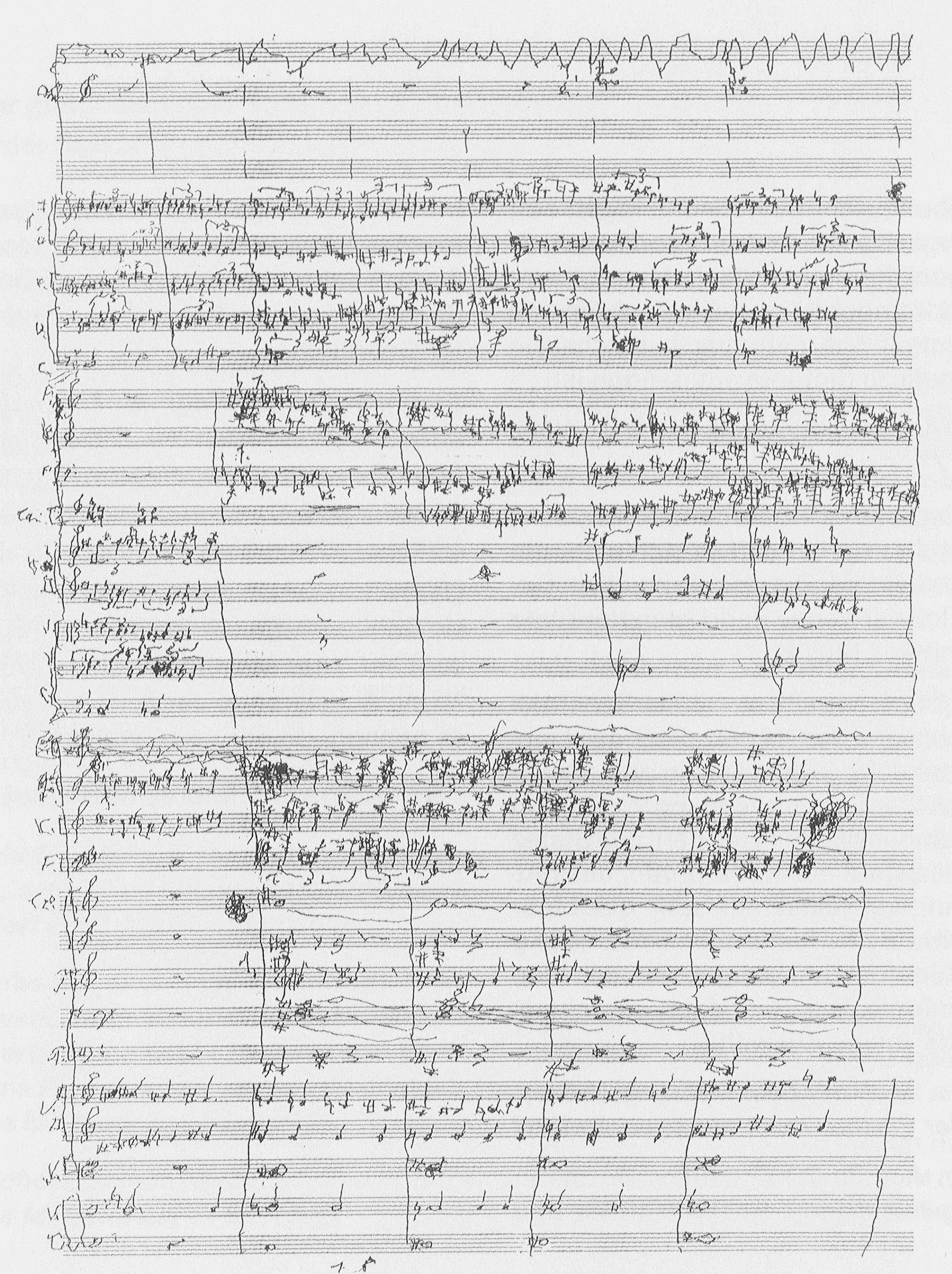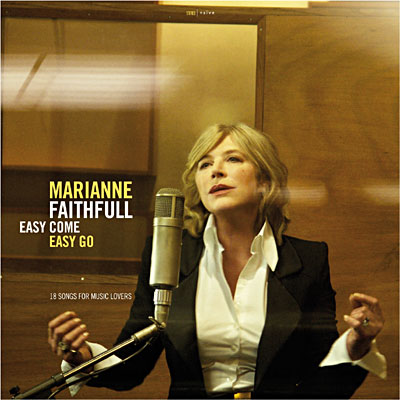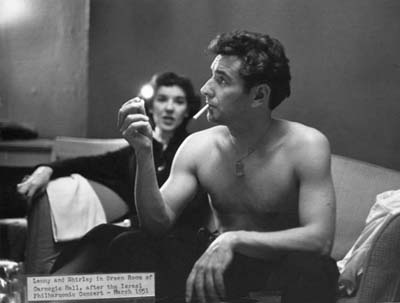
Despite continuing poor health, the composer forges ahead with ambitious plans: an opera based on the life of Gesualdo for the Vienna State Opera, and an Eighth Symphony for the conductor Gennady Rozhdestvensky, who led the dangerous premiere of the First in 1974. He is close upon the mystical symphonic number nine, and might deserve whatever greatness it mythically confers.
Those are the words of Alex Ross from an interview on February 10, 1994 in the New York Times. Â The premiere recording of Schnittke’s 9th symphony has just been released by ECM and my pre-ordered copy arrived in yesterday’s mail. Â The story of Schnittke’s 9th symphony is as fraught with drama as any of the other great Nines. Â He composed it after his third stroke (also in 1994) which left the entire right side of his body paralyzed. Â With great agony, he scrawled the three completed movements using his left hand (see above).
Even the old Bruckner trick of disowning an early Symphony (Schnittke’s “No. 0”) didn’t allow the composer to escape the curse of the ninth: he died on August 3, 1998 from his fourth and final stroke at the age of 63. Â I don’t think there is a more poetic version of the ninth symphony story from any of the other composers who lived through it (Beethoven, Bruckner, Mahler).
[OK, Mahler comes close… and as for Bruckner’s supposedly incomplete 9th, I think he should really be content with the 3 movements that already total 60 minutes of music.]
Schnittke never heard a performance of his 9th symphony.  In fact, the rest of the story of his 9th lends even more poignancy to the tale.  Before Schnittke died, the conductor Gennady Rozhdestvensky prepared a so-called “performing edition” of the 9th, in which he interpolated quotes from historical works by other composers.  Where he found his authority to do so is a mystery.  The composer Matthias Kriesberg continues:
Schnittke was too ill to attend the performance; those close to him report that when he heard a tape, he was livid at the corruption. Some 10 days later, he suffered a stroke from which he never recovered. The Ninth Symphony was originally scheduled for the same Concertgebouw concerts as the Eighth, but performances of this version are now forbidden by the estate.
That was in a 1999 article. Â The next step was for Irina Schnittke, the composer’s widow, to find a composer who could decipher the manuscript and come up with a real performing version. Â She first turned to one of Schnittke’s close associates, Nikolai Korndorf. Â Within months after setting to work on the project, Mr. Korndorf contracted a brain tumor and died. Â Spooky.
Finally, Irina turned to to Alexander Raskatov, a Russian composer born in 1952. Â Mr. Raskatov apparently purchased a “special magnifying glass” and set to work. Â I do not envy his task — how could one possibly be sure of the composer’s intentions given the state of the manuscripts? Â Unlike the completion of Mozart’s Requiem though, which was basically a collaborative composition, Schnittke’s work was “clearly conceived and committed to paper with admirable completeness” (Helmut Peters’ liner notes). Â Mr. Raskatov’s role was to decipher the text as written.
So, does it sound like Schnittke? Â Yes and no. Â But Raskatov himself said:
I know that Alfred Schnittke considered his Ninth Symphony to be a work apart and completely dissimilar to his preceding symphonies. Â As Irina Schnittke expressed it, he wrote this symphony as it were ‘for his departure’.
Well, I can say that I know of no other symphony that starts with this kind of a gesture:
In fact, I can’t even imagine starting a symphony like this. Â I think it is nearly impossible to interpret this piece without reference to mortality, but whereas Dennis Russell Davies comments that this is “a testament by someone who knows he’s dying,” I have a different view: I think this is music of someone who is already dead — as Schnittke had been, having been pronounced clinically dead on several occasions during his strokes. Â Much of the music sounds like the exploratory wanderings of a ghost during his first encounter with a new, otherworldly universe:
Towards the end of the large (20 minute) first movement, during a rather more violent episode, the horns section has an extremely high soli that to me is very reminiscent of some of Ligeti’s pieces from the ’90’s:
The timbre reminds me very much of the ocarinas that Ligeti uses in the Violin Concerto and other pieces. Â No offense to the members of the horn section of the Dresdner Philharmonie.
The second movement proves that, at the very least, Raskatov deciphered Schnittke’s instrumentation correctly:
It just wouldn’t be the Schnitt without that harpsichord in there.
One question I keep coming up against is the total number of movements Schnittke intended for this symphony. Â In all of the articles and liner notes, reference is always made to the “three completed movements,” but there is no mention of the composer’s intentions on how he might have finished the piece. Â Here’s how the third movement ends:
To me, this sounds awfully final. Â But with Schnittke, there is no use in trying to predict what he would or would not do: he was a law unto himself.
The more I listen to this symphony, the more I am intrigued by it. Â It is a delicate work, to be sure, and I think there is a lot of richness to keep exploring in its nuances. Â However, I sincerely doubt that it will in any way replace the special position that the 8th symphony holds in my heart. Â I think Schnittke’s 8th may be the pinnacle of musical art. Â In that piece, Schnittke sustains the most mystical of moods from start to finish, terrifying us in the first movement, torturing us in the second, ravishing us in the third, unnerving us in the fourth, and leaving us to contemplate all of eternity in the fifth, a movement that must stand completely alone in the history of music as the only symphonic movement dedicated solely to the slow amassing of a single chord:
Now go back and listen to the beginning of the 9th and see if it doesn’t sound like the view from the other side.



